Weight Gain: 11 Ayurvedic Herbs That Can Help You To Gain Weight
- Ashwagandha (Withania Somnifera)
- White musli (Chlorophytum Borivilianum)
- Kali musli (Curculigo Orchioides)
- Shilajit (Asphaltum )
- Kaunch powder (Mucuna Pruriens)
- Vidarikand (Pueraria Tuberose)
- Gokhru (Tribulus Terrestris)
- Singhara (Trapa Natans)
- Shatavari (Asparagus Racemosus)
- Yashtimadhu (Glycyrrhiza Glabra )
- Nimbu Satva (Citric Acid)
- Ashwagandha:
 Ashwagandha may support weight gain indirectly by addressing factors such as stress reduction, cortisol regulation, improved energy levels, enhanced muscle strength, and the potential modulation of hormones related to metabolism. Its adaptogenic properties may contribute to a balanced physiological state, promoting overall well-being and potentially aiding individuals in achieving healthy weight gain. However, individual responses can vary, and it’s advisable to consult with a healthcare professional before incorporating Ashwagandha or any supplement into one’s routine.
Ashwagandha may support weight gain indirectly by addressing factors such as stress reduction, cortisol regulation, improved energy levels, enhanced muscle strength, and the potential modulation of hormones related to metabolism. Its adaptogenic properties may contribute to a balanced physiological state, promoting overall well-being and potentially aiding individuals in achieving healthy weight gain. However, individual responses can vary, and it’s advisable to consult with a healthcare professional before incorporating Ashwagandha or any supplement into one’s routine. - White Musli: White Musli, also known as Safed Musli, is another herb in Ayurvedic medicine that is believed to offer various health benefits, including potential support for weight gain.
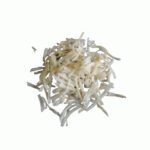 Similar to Shatavari, White Musli is considered an adaptogen and is often used for its rejuvenating and revitalizing properties. It is thought to have aphrodisiac and immune-boosting effects as well. While scientific research on the specific effects of White Musli on weight gain is limited, its adaptogenic nature may contribute to overall well-being, potentially influencing factors like stress, energy levels, and hormonal balance, which could indirectly support healthy weight gain. As with any herbal supplement, individual responses can vary, and it’s advisable to consult with a healthcare professional before incorporating White Musli into your routine, especially if you have pre-existing health conditions or are taking medications.
Similar to Shatavari, White Musli is considered an adaptogen and is often used for its rejuvenating and revitalizing properties. It is thought to have aphrodisiac and immune-boosting effects as well. While scientific research on the specific effects of White Musli on weight gain is limited, its adaptogenic nature may contribute to overall well-being, potentially influencing factors like stress, energy levels, and hormonal balance, which could indirectly support healthy weight gain. As with any herbal supplement, individual responses can vary, and it’s advisable to consult with a healthcare professional before incorporating White Musli into your routine, especially if you have pre-existing health conditions or are taking medications. - Black Musli:
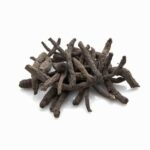 Black Musli, also known as Curculigo or Black Musale, is an herb in traditional Ayurvedic medicine that is believed to potentially support weight gain indirectly. As an adaptogenic herb, Black Musli may contribute to overall well-being by helping the body adapt to stress, promoting vitality, and potentially influencing factors like energy levels and hormonal balance. These effects could play a role in supporting healthy weight gain by encouraging physical activity, muscle development, and overall metabolic balance. However, it’s important to note that scientific research on the specific effects of Black Musli on weight gain may be limited, and individual responses can vary. Consulting with a healthcare professional before incorporating Black Musli or any herbal supplement into your routine is advisable, especially if you have underlying health conditions or are taking medications.
Black Musli, also known as Curculigo or Black Musale, is an herb in traditional Ayurvedic medicine that is believed to potentially support weight gain indirectly. As an adaptogenic herb, Black Musli may contribute to overall well-being by helping the body adapt to stress, promoting vitality, and potentially influencing factors like energy levels and hormonal balance. These effects could play a role in supporting healthy weight gain by encouraging physical activity, muscle development, and overall metabolic balance. However, it’s important to note that scientific research on the specific effects of Black Musli on weight gain may be limited, and individual responses can vary. Consulting with a healthcare professional before incorporating Black Musli or any herbal supplement into your routine is advisable, especially if you have underlying health conditions or are taking medications. - Shilajit:
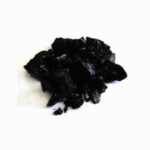 Shilajit is a sticky resin-like substance found in the rocks of the Himalayas, Altai, Caucasus, and other mountain ranges. It is commonly used in traditional Ayurvedic medicine and is believed to offer various health benefits. Regarding weight management, Shilajit may indirectly contribute to weight gain through several mechanisms. It is known for its adaptogenic properties, helping the body adapt to stress and supporting overall vitality. By reducing stress and fatigue, Shilajit may enhance energy levels, potentially promoting physical activity and muscle development, which can contribute to healthy weight gain. Additionally, Shilajit is rich in minerals and fulvic acid, which may play a role in supporting overall metabolic health. It’s essential to consult with a healthcare professional before using Shilajit or any supplement, especially if you have pre-existing health conditions or are taking medications, as individual responses can vary.
Shilajit is a sticky resin-like substance found in the rocks of the Himalayas, Altai, Caucasus, and other mountain ranges. It is commonly used in traditional Ayurvedic medicine and is believed to offer various health benefits. Regarding weight management, Shilajit may indirectly contribute to weight gain through several mechanisms. It is known for its adaptogenic properties, helping the body adapt to stress and supporting overall vitality. By reducing stress and fatigue, Shilajit may enhance energy levels, potentially promoting physical activity and muscle development, which can contribute to healthy weight gain. Additionally, Shilajit is rich in minerals and fulvic acid, which may play a role in supporting overall metabolic health. It’s essential to consult with a healthcare professional before using Shilajit or any supplement, especially if you have pre-existing health conditions or are taking medications, as individual responses can vary. - Kaunch Powder:
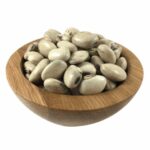 Kaunch powder, derived from the seeds of the Mucuna pruriens plant, is used in traditional Ayurvedic medicine and is believed to have various health benefits. In the context of weight gain, Kaunch powder is thought to offer support through its potential impact on hormonal balance and muscle development. It contains L-DOPA, a precursor to dopamine, which plays a role in regulating mood and supporting overall well-being. By influencing neurotransmitters and hormones, Kaunch powder may indirectly contribute to improved energy levels, reduced stress, and enhanced muscle strength. These factors can promote physical activity and muscle gain, supporting healthy weight. However, it’s crucial to note that scientific evidence on the specific effects of Kaunch powder on weight gain may be limited, and individual responses can vary. Consulting with a healthcare professional before incorporating Kaunch powder or any herbal supplement into your routine is advisable, especially if you have underlying health conditions or are taking medications.
Kaunch powder, derived from the seeds of the Mucuna pruriens plant, is used in traditional Ayurvedic medicine and is believed to have various health benefits. In the context of weight gain, Kaunch powder is thought to offer support through its potential impact on hormonal balance and muscle development. It contains L-DOPA, a precursor to dopamine, which plays a role in regulating mood and supporting overall well-being. By influencing neurotransmitters and hormones, Kaunch powder may indirectly contribute to improved energy levels, reduced stress, and enhanced muscle strength. These factors can promote physical activity and muscle gain, supporting healthy weight. However, it’s crucial to note that scientific evidence on the specific effects of Kaunch powder on weight gain may be limited, and individual responses can vary. Consulting with a healthcare professional before incorporating Kaunch powder or any herbal supplement into your routine is advisable, especially if you have underlying health conditions or are taking medications. - Vidarikand:
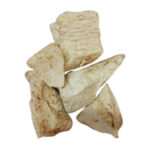 Vidarikand, also known as Pueraria tuberosa, is an herb used in traditional Ayurvedic medicine, and it is believed to have various health benefits. In the context of weight gain, Vidarikand is thought to offer support through its potential effects on vitality and overall well-being. It is considered a Rasayana, or rejuvenating herb, and is believed to have adaptogenic properties, helping the body cope with stress. By reducing stress and promoting overall health, Vidarikand may indirectly contribute to healthy weight gain. Additionally, it is believed to have nutritive properties that could support energy levels, potentially encouraging physical activity and muscle development. As with any herbal supplement, scientific evidence on Vidarikand’s specific effects on weight gain may be limited, and individual responses can vary. Consulting with a healthcare professional before incorporating Vidarikand or any herbal supplement into your routine is recommended, especially if you have pre-existing health conditions or are taking medications.
Vidarikand, also known as Pueraria tuberosa, is an herb used in traditional Ayurvedic medicine, and it is believed to have various health benefits. In the context of weight gain, Vidarikand is thought to offer support through its potential effects on vitality and overall well-being. It is considered a Rasayana, or rejuvenating herb, and is believed to have adaptogenic properties, helping the body cope with stress. By reducing stress and promoting overall health, Vidarikand may indirectly contribute to healthy weight gain. Additionally, it is believed to have nutritive properties that could support energy levels, potentially encouraging physical activity and muscle development. As with any herbal supplement, scientific evidence on Vidarikand’s specific effects on weight gain may be limited, and individual responses can vary. Consulting with a healthcare professional before incorporating Vidarikand or any herbal supplement into your routine is recommended, especially if you have pre-existing health conditions or are taking medications. - Gokhru:
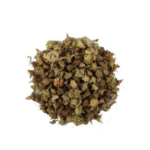 Gokhru, also known as Tribulus terrestris, is an herb commonly used in traditional Ayurvedic medicine and various traditional systems for its potential health benefits. In the context of weight gain, Gokhru is believed to offer support through its effects on hormonal balance and overall vitality. It is often considered an adaptogen, helping the body adapt to stress, and is thought to influence testosterone levels. Higher testosterone levels can contribute to muscle development, which may indirectly support healthy weight gain. Additionally, Gokhru is known for its diuretic properties and is used for kidney and urinary health. Proper hydration and kidney function are essential for overall health, including muscle development. However, it’s important to note that while Gokhru has traditional uses, scientific evidence on its specific effects on weight gain may be limited. Consulting with a healthcare professional before incorporating Gokhru or any herbal supplement into your routine is advisable, especially if you have pre-existing health conditions or are taking medications.
Gokhru, also known as Tribulus terrestris, is an herb commonly used in traditional Ayurvedic medicine and various traditional systems for its potential health benefits. In the context of weight gain, Gokhru is believed to offer support through its effects on hormonal balance and overall vitality. It is often considered an adaptogen, helping the body adapt to stress, and is thought to influence testosterone levels. Higher testosterone levels can contribute to muscle development, which may indirectly support healthy weight gain. Additionally, Gokhru is known for its diuretic properties and is used for kidney and urinary health. Proper hydration and kidney function are essential for overall health, including muscle development. However, it’s important to note that while Gokhru has traditional uses, scientific evidence on its specific effects on weight gain may be limited. Consulting with a healthcare professional before incorporating Gokhru or any herbal supplement into your routine is advisable, especially if you have pre-existing health conditions or are taking medications. - Singhara:
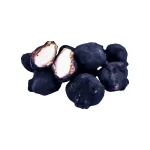 Singhara, also known as Water Chestnut or Trapa natans, is a nutritious aquatic plant commonly used in traditional medicine, particularly Ayurveda. While Singhara is not typically associated with direct effects on weight gain, it offers various health benefits that could indirectly support overall well-being. Singhara is low in calories and fat, making it a healthy addition to a balanced diet. It provides essential nutrients, including potassium, fiber, and vitamins, which can contribute to overall health. Maintaining a nutrient-rich diet is essential for supporting various bodily functions, including metabolism and energy levels. Furthermore, Singhara is often considered a cooling food in Ayurveda and is used to balance Pitta dosha. A balanced dosha is believed to promote overall health and may indirectly contribute to a healthy weight. While Singhara may not have specific properties that directly promote weight gain, its nutritional content and potential impact on overall health make it a valuable addition to a well-rounded diet. As always, it’s advisable to consult with a healthcare professional or a qualified nutritionist for personalized advice on dietary choices, especially if you have specific health goals or concerns.
Singhara, also known as Water Chestnut or Trapa natans, is a nutritious aquatic plant commonly used in traditional medicine, particularly Ayurveda. While Singhara is not typically associated with direct effects on weight gain, it offers various health benefits that could indirectly support overall well-being. Singhara is low in calories and fat, making it a healthy addition to a balanced diet. It provides essential nutrients, including potassium, fiber, and vitamins, which can contribute to overall health. Maintaining a nutrient-rich diet is essential for supporting various bodily functions, including metabolism and energy levels. Furthermore, Singhara is often considered a cooling food in Ayurveda and is used to balance Pitta dosha. A balanced dosha is believed to promote overall health and may indirectly contribute to a healthy weight. While Singhara may not have specific properties that directly promote weight gain, its nutritional content and potential impact on overall health make it a valuable addition to a well-rounded diet. As always, it’s advisable to consult with a healthcare professional or a qualified nutritionist for personalized advice on dietary choices, especially if you have specific health goals or concerns.
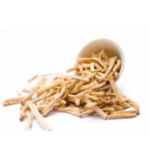 Shatavari: Shatavari, also known as Indian Asparagus or Shatavari, is a popular herb in Ayurvedic medicine believed to offer various health benefits, including potential support for weight gain. It is widely acknowledged as an adaptogen, aiding the body in adjusting to stress and promoting overall wellness. Shatavari may indirectly contribute to healthy weight gain through several mechanisms. Its ability to balance hormones, particularly estrogen, can have positive effects on reproductive health, potentially influencing weight regulation. Additionally, Shatavari is known for its rejuvenating and nourishing properties, which may enhance overall energy levels and vitality, promoting physical activity and muscle development. As with any supplement, individual responses can vary, and it’s recommended to consult with a healthcare professional before incorporating Shatavari into your routine, especially if you have underlying health conditions or are taking medications.
Shatavari: Shatavari, also known as Indian Asparagus or Shatavari, is a popular herb in Ayurvedic medicine believed to offer various health benefits, including potential support for weight gain. It is widely acknowledged as an adaptogen, aiding the body in adjusting to stress and promoting overall wellness. Shatavari may indirectly contribute to healthy weight gain through several mechanisms. Its ability to balance hormones, particularly estrogen, can have positive effects on reproductive health, potentially influencing weight regulation. Additionally, Shatavari is known for its rejuvenating and nourishing properties, which may enhance overall energy levels and vitality, promoting physical activity and muscle development. As with any supplement, individual responses can vary, and it’s recommended to consult with a healthcare professional before incorporating Shatavari into your routine, especially if you have underlying health conditions or are taking medications.- Yashtimadhu: Yashtimadhu
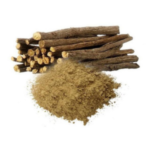 , commonly known as Licorice, is a versatile herb in Ayurvedic medicine, valued for its anti-inflammatory, antioxidant, and adaptogenic properties. While it is recognized for promoting digestive health, soothing respiratory issues, and aiding in stress management, scientific evidence specifically linking Yashtimadhu to weight gain is limited. Nevertheless, its overall impact on well-being, including potential contributions to digestive and stress-related factors, may indirectly support a healthy weight. It is crucial to consult with a healthcare professional before incorporating Yashtimadhu into your routine, especially if you have existing health conditions or are taking medications, to ensure safe and appropriate use.
, commonly known as Licorice, is a versatile herb in Ayurvedic medicine, valued for its anti-inflammatory, antioxidant, and adaptogenic properties. While it is recognized for promoting digestive health, soothing respiratory issues, and aiding in stress management, scientific evidence specifically linking Yashtimadhu to weight gain is limited. Nevertheless, its overall impact on well-being, including potential contributions to digestive and stress-related factors, may indirectly support a healthy weight. It is crucial to consult with a healthcare professional before incorporating Yashtimadhu into your routine, especially if you have existing health conditions or are taking medications, to ensure safe and appropriate use. - Nimbu Satva:
 Nimbu Satva, also known as Citrus limon extract or Lemon Satva, is a preparation derived from lemon or lime and is used in Ayurvedic medicine. It is valued for its refreshing and digestive properties. While not directly associated with weight gain, Nimbu Satva is often used to enhance digestion and alleviate digestive discomfort. The citrusy nature of Nimbu Satva may stimulate the digestive system, promoting the secretion of digestive enzymes and improving overall digestion. Maintaining a healthy digestive system is essential for nutrient absorption and metabolism, factors that indirectly contribute to overall well-being, including weight management. However, specific scientific evidence linking Nimbu Satva to weight gain is limited. As with any herbal remedy, it’s recommended to consult with a healthcare professional or an Ayurvedic practitioner before incorporating Nimbu Satva into your routine, especially if you have underlying health conditions or are on medications.
Nimbu Satva, also known as Citrus limon extract or Lemon Satva, is a preparation derived from lemon or lime and is used in Ayurvedic medicine. It is valued for its refreshing and digestive properties. While not directly associated with weight gain, Nimbu Satva is often used to enhance digestion and alleviate digestive discomfort. The citrusy nature of Nimbu Satva may stimulate the digestive system, promoting the secretion of digestive enzymes and improving overall digestion. Maintaining a healthy digestive system is essential for nutrient absorption and metabolism, factors that indirectly contribute to overall well-being, including weight management. However, specific scientific evidence linking Nimbu Satva to weight gain is limited. As with any herbal remedy, it’s recommended to consult with a healthcare professional or an Ayurvedic practitioner before incorporating Nimbu Satva into your routine, especially if you have underlying health conditions or are on medications.


